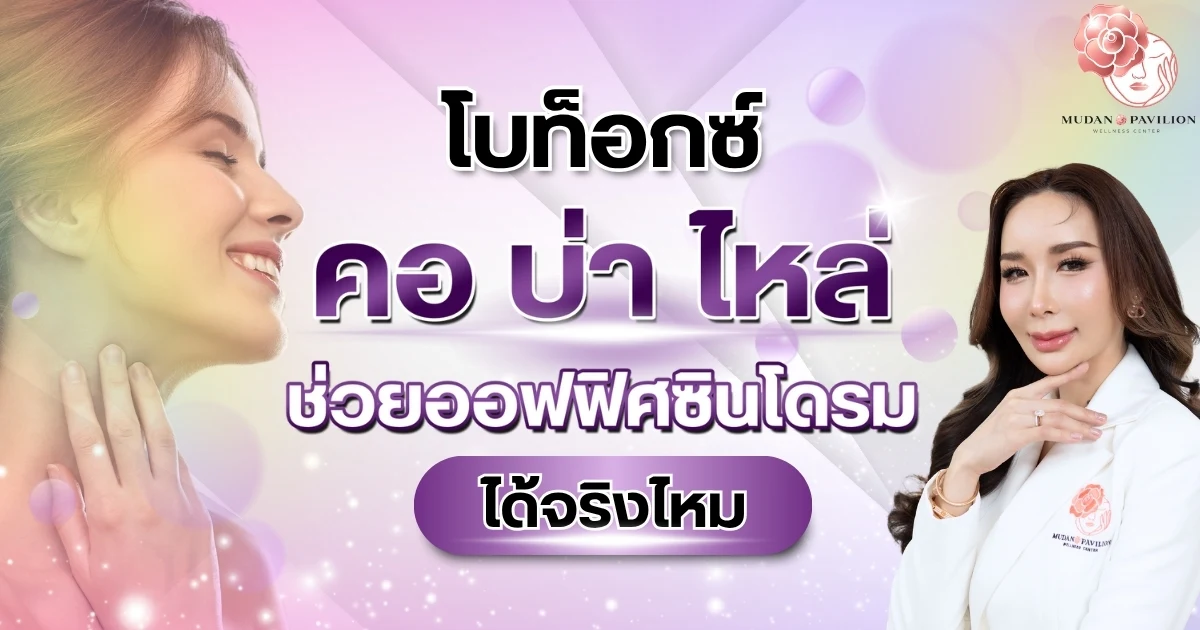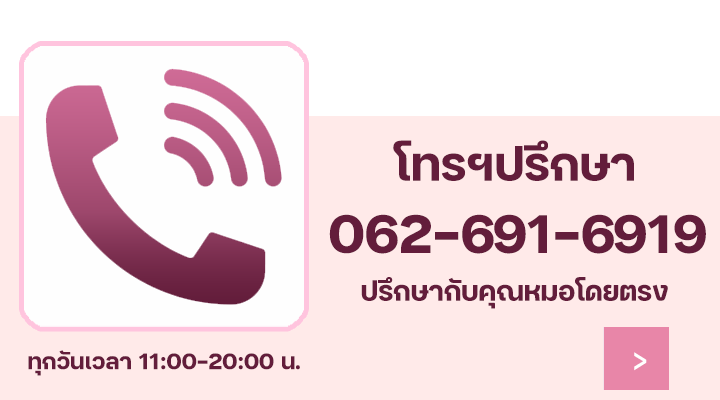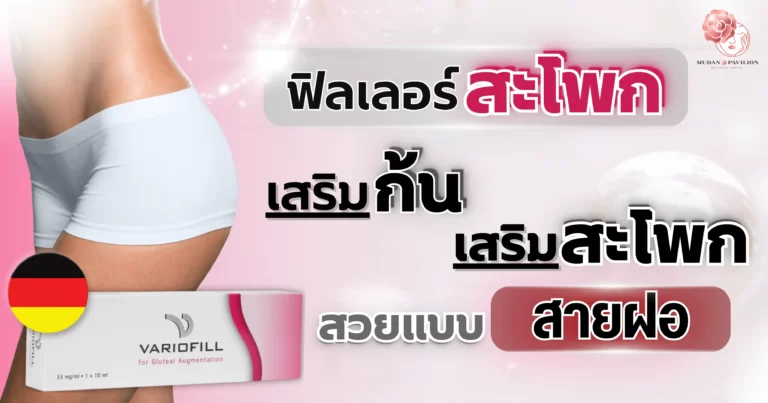Botox neck shoulder This is another topic that is talked about among office workers who have to sit in front of the computer for a long time until they have chronic muscle pain, especially those with office syndrome. Botox injections in the neck, shoulders, and arms are another option that helps to relax tense muscles, reduce stiffness, and help you move better in your daily life. For those who are interested in this method, this article will help you understand what Botox for the neck, shoulders, and arms is, who it is suitable for, and how much it can help with office syndrome.
Botox neck shoulder
- What is Botox?
- What is Office Syndrome?
- What does Botox for the neck and shoulders help with?
- Who is Botox for the neck, shoulders, and back suitable for?
- Preparation steps for neck, shoulder and back botox injections
- Take care of yourself after getting Botox injections in your neck, shoulders, and arms.
What is Botox?
Botox is the trade name of a type of drug, Botulinum Toxin, which is a substance extracted from a specific strain of bacteria called Clostridium botulinum. The substance is in the form of a protein that has special properties to bind to the ends of nerves used to control muscles and then inhibit the stimulation of muscles supplied by the nerves in that area. This will cause the muscles in that area that have been injected with Botox to be unable to contract and remain relaxed. In the beauty industry, Botox helps reduce sweating, reduce wrinkles, improve the shape of the face, and also helps tighten sagging skin. But it must be under the care of a doctor.
What is Office Syndrome?

Office Syndrome is a group of muscle pain symptoms or numbness from inflammation of tissues and tendons, which is often caused by the regular and continuous use of the same muscles, such as sitting cross-legged for a long time, sitting with a hunched body, or bending down for a long time, etc., resulting in muscle inflammation and pain in various parts of the body, especially the back, shoulders, neck, shoulders, wrists, and arms. In addition, stress, pressure, and anxiety are also other causes of office syndrome. Most of the symptoms of office syndrome that can be found are muscle pain, trigger finger, inflammation of the tendons, dry eyes, eye pain, headache, back pain, and the formation of fibrosis in the wrist area. Office syndrome symptoms often occur in office workers, laborers, or athletes.
Office Syndrome is a term used in Thai language. Work-Related Musculoskeletal Disorder Or abbreviated as WMSD, and this is the word that is closest to the Thai word “office syndrome”.
What does Botox for the neck and shoulders help with?
As you know, Botox neck and shoulder is an injection of Botulinum Toxin into the neck, shoulders, and arms. The substance will temporarily inhibit the function of the nerves that control muscle contractions, causing the muscles in that area to relax and reduce spasms, which will help relieve office syndrome pain, solve the problem of abnormal muscle contractions, reduce muscle spasms that cause stiff or stretched shoulders, and also help adjust the shape of the shoulders to be beautiful, reduce the size of the shoulders to be smaller, make the neck longer, solve the problem of hunched shoulders, frozen shoulders, and reduce headaches from stress caused by shoulder muscles or upper back that work hard and become stiff.
Who is Botox for the neck, shoulders, and back suitable for?
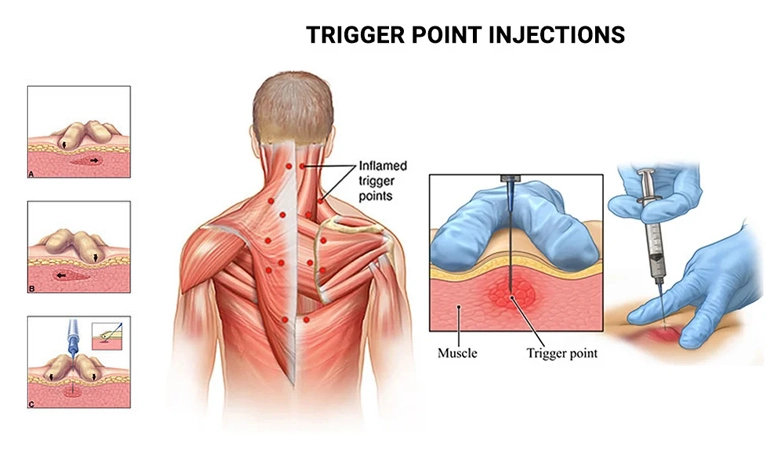
Preparation steps for neck, shoulder and back botox injections
As you know, Botox injections in the neck, shoulders, and arms are injections of substances that have properties that help inhibit the functioning of nerves that temporarily control muscle contractions, causing the muscles in that area to relax and reduce spasms. Therefore, in order to avoid side effects on the body and to get results that meet your needs, those who have Botox injections should do the following:
- Before getting Botox injections, the person getting the injection should see a doctor for consultation, symptom assessment, and physical examination to prepare themselves.
- The person receiving the injection should inform the doctor of their medical history, such as chronic diseases, drug allergies, or medications they are taking regularly.
- Do not take any supplements or vitamins that have properties that make blood clot difficult, such as evening primrose oil, fish oil, vitamin E, extracts from ginseng, ginger, garlic, and ginkgo leaves for 2 weeks before the injection.
- Do not take pain relievers, aspirin, and NSAIDS such as Naproxen or Ibruprofen for 2 weeks prior to the injection.
- Do not drink any type of alcoholic beverage for 1-2 days.
- Before injection, because alcohol may improve blood circulation.
- and increase the chance of bruising
- Avoid massaging or pressing on the neck, shoulders and back for 7 days before the injection.
- Avoid wearing makeup or applying cream on the neck, shoulders, and back to allow the doctor to thoroughly cleanse the skin before the injection.
- The person who will be injected should wear loose and comfortable clothing to facilitate easy access to the injection area.
- The person giving the injection should get enough rest to allow the body to relax and reduce anxiety.
- Those who will undergo botox injections must not have muscle weakness, be pregnant, or breastfeed.
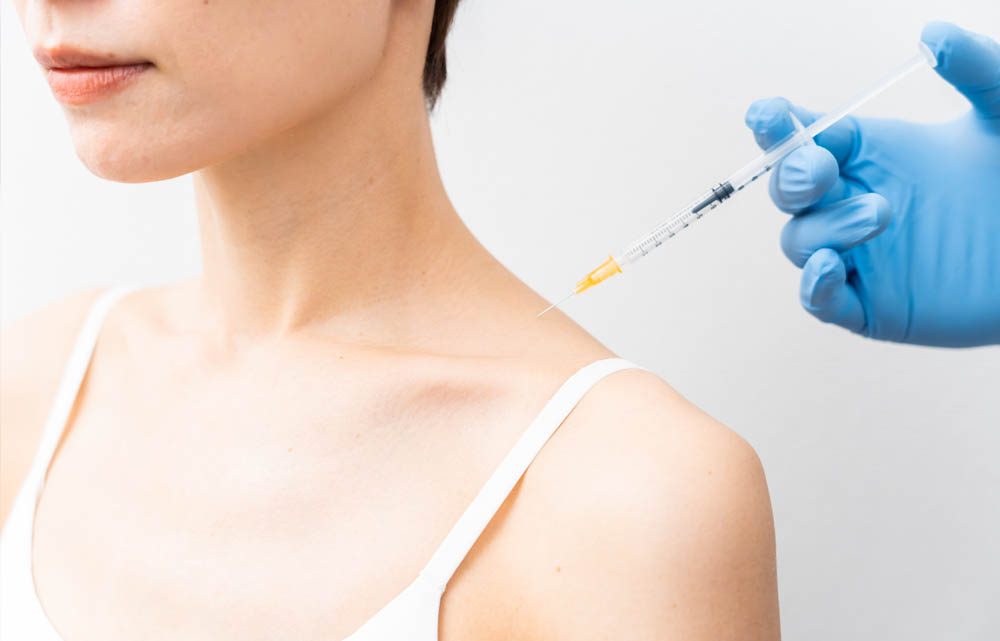
Take care of yourself after getting Botox injections in your neck, shoulders, and arms.
After botox injection, you should take care of yourself properly to make the results last longer and for the best results. The person who gets the injection should do the following:
- Avoid massaging, pressing, or touching the injection site as this can cause the botox to spread to unwanted areas, which may affect the results.
- Avoid lying flat or on your stomach, including bending your head down 3 cm below your chest to prevent the flow of botox to unwanted areas.
- Avoid applying cold compresses as this may interfere with the absorption of substances into the nerve cells.
- Avoid laser treatments such as Ulthera or Thermage for 14 days after the injection.
- Avoid drinking alcoholic beverages as alcohol stimulates blood vessels to dilate.
- Resulting in inflammation in the injection area.
- Avoid eating spicy food, pickled food, or food that contains substances that stimulate blood vessels to dilate, such as tea, coffee, or chocolate, for 14 days.
- Avoid strenuous exercise such as weight lifting, running, or aerobics for 2 days.
- Avoid wearing tight clothing around the neck or shoulders for 24 hours.
- Avoid saunas, steam baths, long hot baths, and hot compresses for 1-7 days.
- Avoid bending over, carrying heavy bags, carrying a bag on one side, and lifting weights regularly.
- To prevent muscles in the neck, shoulders and back from becoming tense or strained.
- Posture adjustments should be made for daily life. Sitting for longer than 1 hour without changing positions should be avoided. Stand up and stretch every hour.
- Drinking enough water helps the botox spread better and helps the blood circulate easily, as well as reducing swelling.
- Those who have injections should have Botox injections continuously, but should be within the time frame prescribed by the doctor for safety and to maintain the results.
- The person receiving the injection should have an appointment with the doctor to monitor symptoms and see the results.

